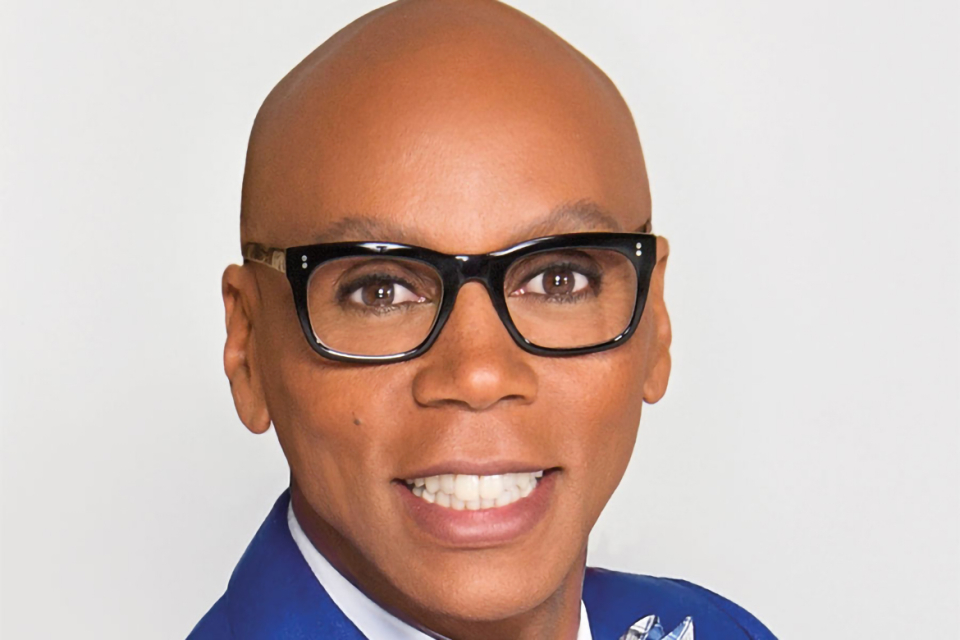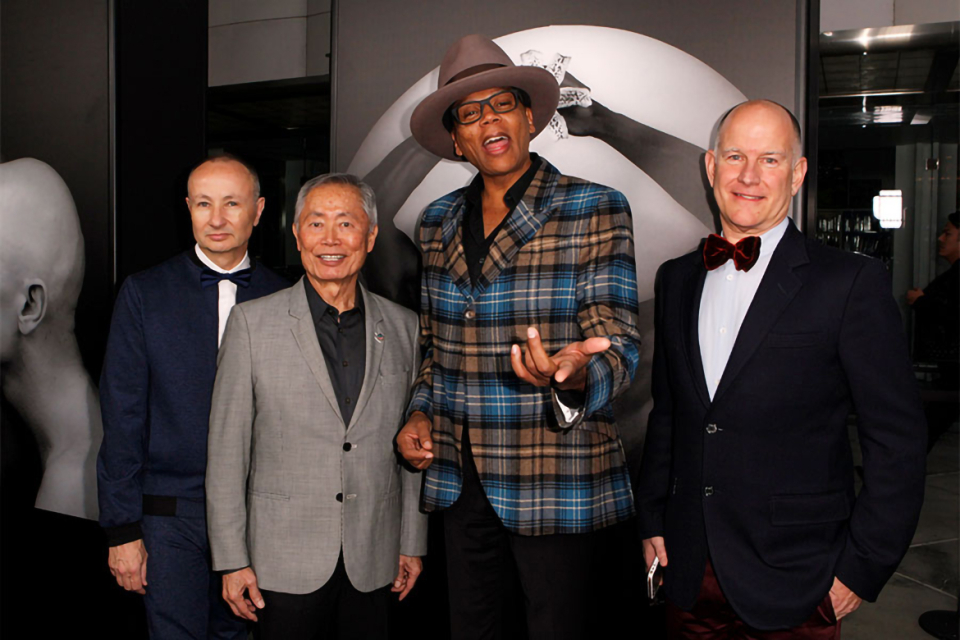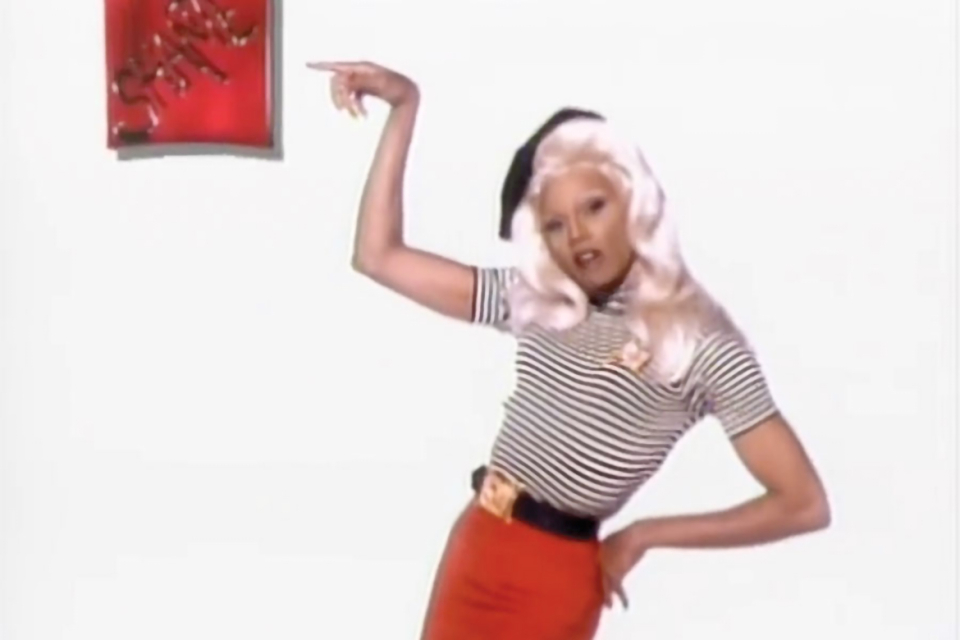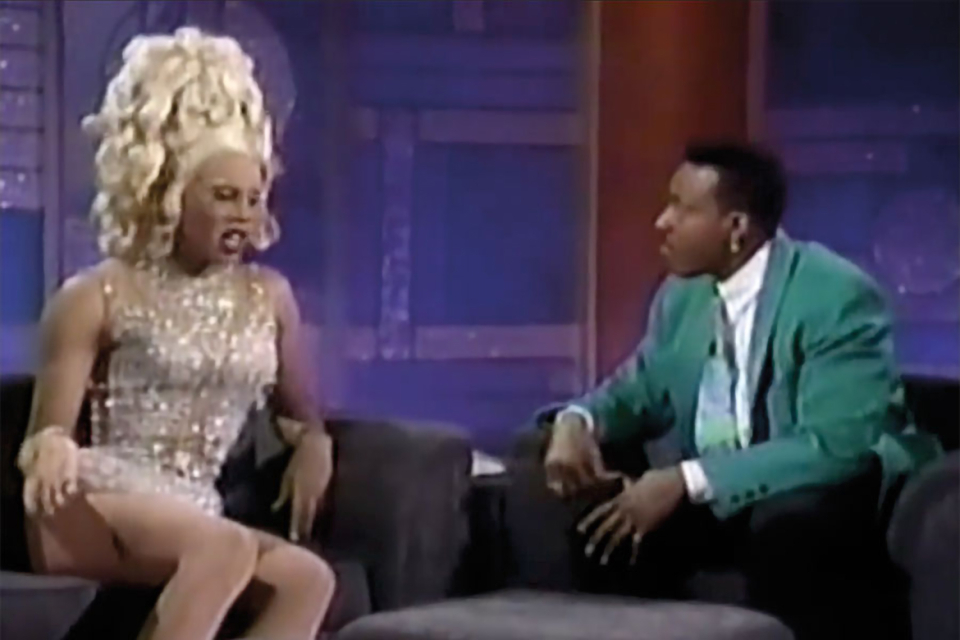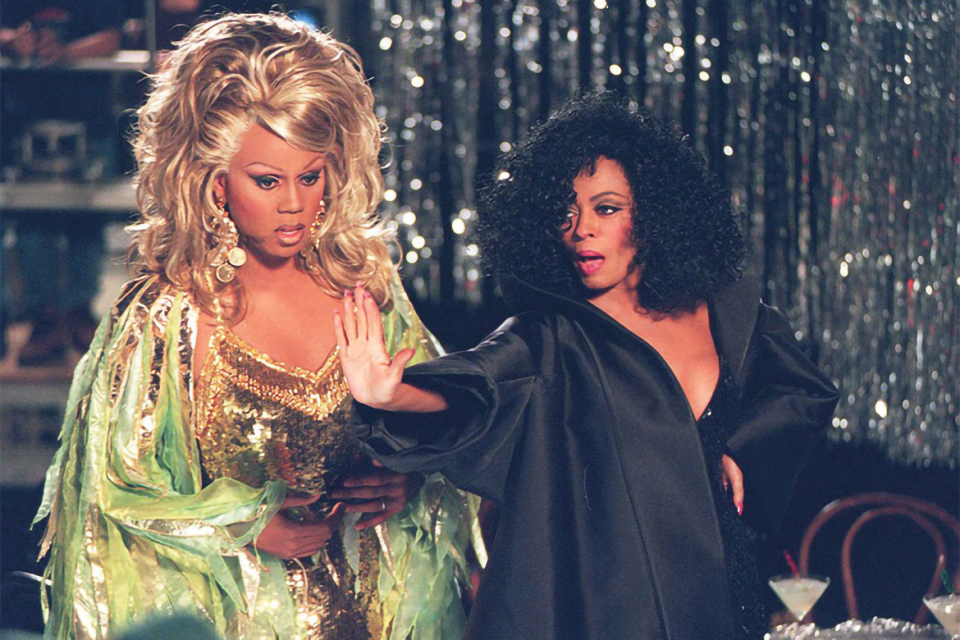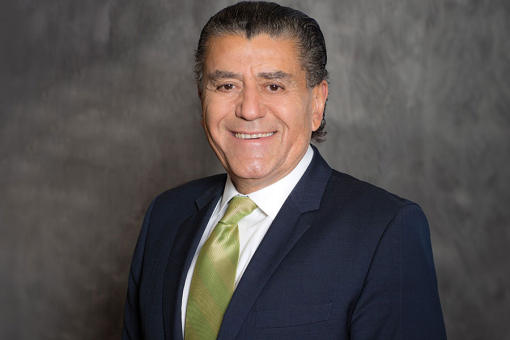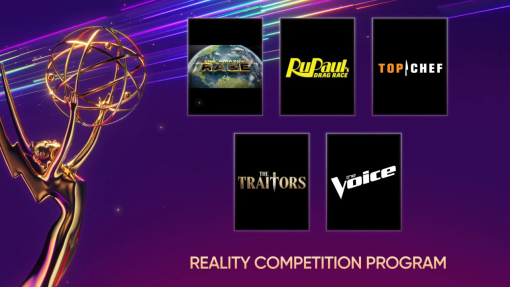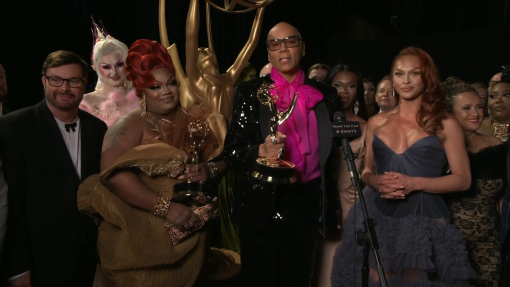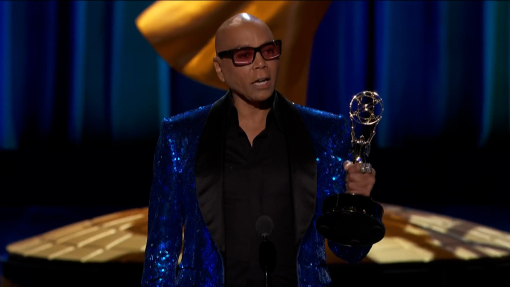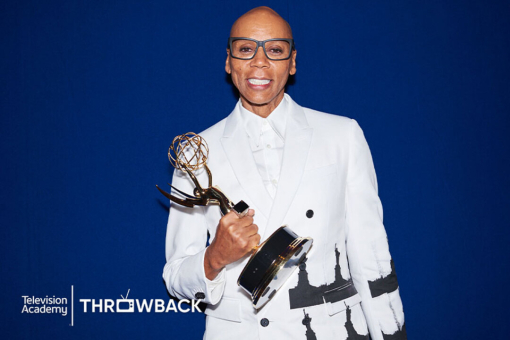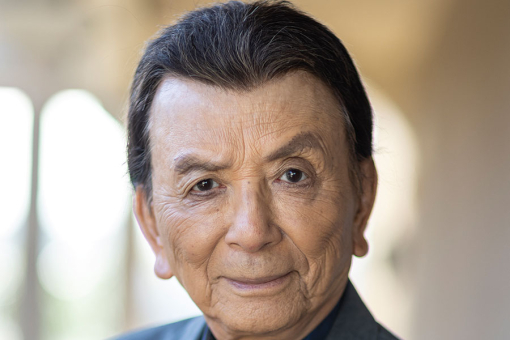From an early age, RuPaul Charles was drawn to what lay beyond.
"As a kid, I knew that this couldn't be all there was to life," he says. "I couldn't accept life on face value."
Following his own advice ("You have to customize the life you were meant to have"), he sought the unconventional, as a singer, songwriter, actor and model, among other pursuits.
Ultimately, he took "two parts Dolly Parton, a spoonful of Cher and Diana, a smidge of David Bowie," and created a drag-queen persona that entered the realm of single-name superstars (like his beloved Cher) while also becoming an advocate for self-acceptance and self-determination.
Born in San Diego and later raised in Atlanta, Charles brought drag from the margins of society to mainstream success, most recently with his show, RuPaul's Drag Race.
The reality competition series — in which contestants vie for the title of America's Next Drag Superstar — started on Logo in 2009, then moved in 2017 to VH1, where it's now wrapping season eleven. Last year The New York Times declared: "Drag Race has become a staple of modern television for the way it skewers expectations and attitudes about gender."
A four-time Emmy winner for Drag Race (three times as host and once as producer), Charles says the program conveys a universal message of hope: "Our show is really about the tenacity of the human spirit. Every human alive can relate to that."
Charles was interviewed in June 2018 by Television Academy Foundation executive director Jodi Delaney for The Interviews: An Oral History of Television, a program of the foundation. The following is an edited excerpt of their conversation. The entire interview can be screened at TelevisionAcademy.com/Interviews.
Q: Where did your name, RuPaul, come from?
A: My mother named me. She knew I was going to be a star and she wanted me to have a unique name. She also wanted to incorporate some of her Creole background, which is where the Ru comes from — the roux from a gumbo.
And there's a July 1960 copy of Ebony magazine with Fats Domino on the cover, and inside he's at his house, sitting with friends, and one of his friends' name is Ripoll Roberts. My mom turned it into RuPaul.
Q: Did you watch much television as a kid?
A: We didn't always have a television, but I loved television. Monty Python changed my life, because it was the first time I realized that my tribe was out there. I had to just hold on and find them.
As a kid, I knew that this couldn't be all there was to life. I couldn't accept life on face value. So when I found people on television who were being so irreverent and who said, "Gender? Ha!" and "Identity, huh- hoo!" I thought, "That's my crowd."
Q: As a teenager, you moved from San Diego to Atlanta….
A: I was having trouble in high school, so I moved in with my soul sister, Renetta, who is seven years older than me and had moved to Atlanta with her husband.
I enrolled in the Northside School of Performing Arts, and it changed everything for me. I really did find my tribe. I wasn't weighed down by what I was supposed to be in San Diego, by all the people who knew me there. I was free to create a new life for myself.
Q: Were you looking to be in television and music at that time?
A: I knew that I was going to be famous. I didn't know what I was going to be or do, and I was open to it. That is the real work of an artist — to not judge the work and to just let it come through you.
I knew that I loved David Bowie, Diana Ross, Cher and James Brown. My first inclination was to just copy David Bowie. In my tribe in Atlanta, that was the common denominator. All us kids were devotees of David Bowie.
Q: Was it in Atlanta that you went on television for the first time?
A: Yes. I happened upon a public access show called The American Music Show. It was unproduced, raw, and I loved it. I wrote them a letter, and they called and said, "Why don't you come on our show?" Some friends of mine put together a dance routine to Junior Walker & The All Stars' "Shotgun," and that was the beginning of my relationship with these wild, crazy people who were fabulous.
Q: Did you discover drag in Atlanta?
A: I'd always been aware of drag, because of television and watching Flip Wilson, one of my mother's favorites. And I'd seen drag with Jonathan Winters and Milton Berle.
But when Flip Wilson did Geraldine, something clicked. He elevated it to this really fun place, because he was celebrating this character in a way that I don't believe men in drag had done before. He was doing it in a way that wasn't misogynistic. It wasn't making fun of women. It was really quite beautiful.
Q: Eventually you went to New York….
A: My friends and I all moved to New York in '84, and after six months, New York City spit me right back out. I was couch-surfing, sleeping in the park, on the piers, never making enough money to get an apartment. When the holidays came around, I had to go back to Atlanta and get myself together. I moved back to Atlanta in '85, and then back to New York in '87.
Q: Let's talk about Fenton Bailey and Randy Barbato, partners in World of Wonder Productions and your fellow executive producers on RuPaul's Drag Race.
A: The first time I became aware of them was through [director] Dick Richards. He ran The American Music Show and he was my mentor in Atlanta. He told me about [Fenton and Randy's group] the Fabulous Pop Tarts.
I met Fenton in New York at the Pyramid Club. He had come in to hear a song they had just recorded on the sound system there, and I went over and said, "Is this your record?" That was that.
A year later, I met Randy in the lobby of the Marriott Marquis in Times Square at the New Music Seminar. I was wearing the most outrageous outfit — a mohawk with a loincloth and football shoulder pads, with thigh-high wading boots and maybe a crop top.
I think Dick introduced us, and I'm going to say this without crying — everything that I've done in my career I could see reflected back in Randy's eyes. I could see that he could see my potential. I had never met anyone who could see that. I couldn't articulate it. I couldn't explain it. But when I looked in his eyes, I could see it. I work with them to this day, and that was 1985.
Q: Why has your relationship lasted so long?
A: Love, respect and trust. That's the key to all relationships: trust. And we come from that same irreverent punk-rock background where we want to shake things up in a way that's helpful.
When I speak to Randy — and I speak to him every day — I feel like the smartest person on the planet. I never feel uncomfortable about not finishing high school. I never feel like he's judging me. When we do Drag Race or any of our other projects, I know that in the editing booth he and Fenton are not going to let anything go by that will make me feel bad. I'm free to be myself.
Q: After you started working with Randy and Fenton, your song "Supermodel (You Better Work)" became a hit. Then you appeared on The Arsenio Hall Show ….
A: Arsenio was my breakthrough. That's when the whole world got to see me. The video for "Supermodel" ran on MTV; it wasn't in heavy rotation, but people knew of it. My mother was on her deathbed, literally, when she got to see my interview on MTV with Kurt Loder — it was the first time she had evidence that her prophecy had come true. That was probably in February '93, and she passed away in April '93.
Q: What a time that must have been.
A: It was pretty wild. When I think back on that time, how beautiful this sendoff was for my mother, and for me to enter into this next phase of my life… It was really quite lovely.
Q: So on Arsenio, you were in front of an enormous audience for the first time. What was your message?
A: My platform has always been the same. I remember at 13 thinking that the world wanted to put me in some type of box that it could understand. And I thought, "Do whatever it takes to not get body-snatched into that box. Remember who you really are. Remember what you came here to do." And what I came here to do, what's important, is love. Love is all that matters.
It sounds so cliché, and the ego says, "Right, that'll get you a hamburger on a hungry day." Actually, it will. I've maintained that as my platform. Love somebody. Give love to somebody. Love yourself. Learn that this body you're in is a temporary thing. Experience what it is to be a human on this planet.
Q: In 1996 you launched The RuPaul Show, your talk-variety show, on VH1….
A: That was the manifestation of the bohemian dream that we had all been promised through the Warhol experience, which was our creed, our mantra, our bible. To have a show that was so eclectic, that borrowed bits and pieces from everything we had ever seen before, was this postmodern idea of what a talk show should be.
I walked out on a runway — we had lifted that from The Cher Show. And we booked the show based on who I was interested in talking to — Bea Arthur, Esther Rolle, Tammy Faye Bakker…. I was interested in people who exemplified that survivor instinct, that outside-the-box philosophy.
How do you take something like a Campbell's soup can that we see every day and turn it into art or something irreverent? How do you rebirth it into something even bigger and better than it is? That was the philosophy behind the VH1 talk show.
Q: Who were some of your favorite guests?
A: Diana Ross, my idol, was my first guest. And to have Cher on the show — Cher is my other idol! When I think back on that time, I think about how much fun it was to do this show every day with all of my friends: Michelle Visage [now a judge on RuPaul's Drag Race] and I would share a dressing room. Randy and Fenton were the producers, and we did 100 episodes.
Q: So you're openly gay. You're black. You're a drag queen. The world had not seen this before on television the way that you were doing it. Was that a burden?
A: It didn't feel like a burden. Because when I was 13 and made that pact with myself to never put myself in that box, I always felt like the Boy Who Fell to Earth. I was looking for others like me. I always thought my people were out there somewhere.
And I found them in Randy and Fenton and my tribe, and we have continued to create content that speaks to that outsider, the person who dances to the beat of a different drummer. But it's also there for everyone else. Drag Race is really about the tenacity of the human spirit. Every human alive can relate to that.
Q: What was your path to Drag Race?
A: After the VH1 show went off the air, I was pretty burned out; I had worked really hard. By 1999, I moved out to Los Angeles, keeping my place in New York. I quit drinking. Decided to pull back a little bit. For about four years, I just chilled. I'd record, I'd write, but it was a weird time. I even contemplated quitting show business in '03.
And then something changed. I thought, "I should put my own music out. I want to take control of it myself." Along with getting sober, I got into therapy, and wanted to understand why I do the work that I do. And what came out of that was a new reason to be in show business.
A lot of what I had done before was because I wanted my father's attention and to be validated by him. Through therapy I realized, "No, my motivation can't be that. It has to be laughter, colors, music, dancing, beauty, love — all of the things that make life worth living."
I found a new approach to everything. And in '04 I was offered another radio job in New York. I went back with Michelle Visage and I was invigorated.
Randy was so jazzed about my new approach. He said, "Do you think now you'd be willing to do a reality show?" They had asked me many times before, but I didn't want to do it, because I didn't want to do anything mean-spirited or hurtful. But he said, "We want to do a reality show that celebrates the art form of drag." I said, "Sure, let's do it."
By then Tom Campbell had started working with Randy and Fenton. He'd been a friend of ours for many years. Brilliant man. Tom came up with the concept of a drag race, and we took it around to five networks. Then we took it to Logo, and Logo pretty much bought the show in the room.
Q: Talk about some of the catchphrases we hear on Drag Race.
A: Drag is so brilliant because it samples everything. Drag is there to remind people to not take life too seriously. It says, "Identity is ridiculous. You are a shapeshifter. You are God. You have many different forms. This is not your only form. Have fun with it."
I believe in cultural appropriation. I say, sample everything on the buffet table. The ego wants to separate people. Don't believe the ego. We are all everything. Drag queens like to sample and twist phrases. If someone's a boy, we call them a girl. We say even more crude things as terms of endearment.
My mother loved sayings, and she passed that on to me. I remember the first time I heard someone say, "Ooh, you better work." I went, "What did you say?" And I wrote it down. I've always collected sayings and phrases, and the girls come up with phrases that they try to make work.
Q: You're the host of Drag Race, a mentor, the head judge, an executive producer. How do you wear all those hats?
A: In show business you learn that no one's going to give you the job. You've got to create the job for yourself. I tell people all the time who are hemming and hawing about their agents not getting them things: "Their job is to handle paperwork, but you create the jobs."
Having chosen a form of show business that no one had really done before, you've got to make it up as you go along. That's where being an artist comes in. You have to create your own life. There's no place for a black, blonde drag queen — unless you create it. On our show, we've made a place for a black, blonde drag queen. You have to customize the life you were meant to have.
Q: What do you hope audiences take away from Drag Race?
A: That the courage these [contestants] have — against all odds — is also in you. You have that courage.
Twenty years ago, I explained to my therapist that my drag persona is the Superman to my Clark Kent. And she said, "Ru, you can access that same power in drag and out of drag!" I thought, "What?!" It had never occurred to me!
It's like Dorothy [in The Wizard of Oz] — you could've gone home at any time? What?! All that time I spent doubting myself and feeling powerless, I had the power all the time.
Q: You have your public persona and your private life. How does that work?
A: It works out very well, because with drag, I get to take the mask off. There's always the delineation between my public persona and who I am in private. I've never once thought of myself as this omnipotent, untouchable star. It's all a ruse. I've concocted this thing of two parts Dolly Parton, a spoonful of Cher and Diana, a smidge of David Bowie, and said, "Okay, here it is."
That's what I've done, but never once thinking, "Oh, that is me." It's a part of me, but the me is still that introvert who is masquerading as an extrovert. I feel very comfortable with that.
Q: How do you feel about being a role model and having TV as a platform for social change?
A: I did not set out to be a role model. But I will say that everything I've learned I learned from television.
I learned about jazz from The Mike Douglas Show. He had Ella [Fitzgerald] and Sarah [Vaughan] and Anita O'Day on, and I got my education there. I learned how to find my tribe from Monty Python. I learned how to emcee a show from watching Cher and Diana Ross specials. And I learned how to articulate an esoteric idea from watching David Bowie.
Everything I know I learned from television.
This article originally appeared in emmy magazine, Issue No. 5, 2019

